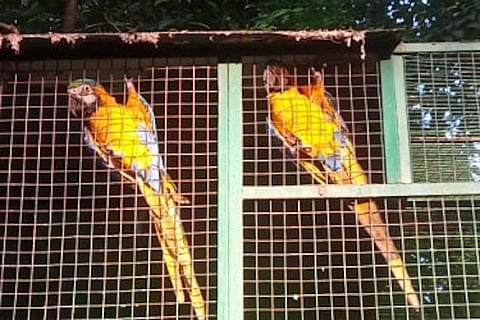

The forests of Palakkad, though dense, humid and filled with fascinating creatures in their own right, are certainly not where you expect to find the cries of blue-and-gold macaus, Brazilian toucans or white cockatoos. But as you roll into Puthanveedu, an unassuming compound in the quiet leafy town of Cherupulasseri, this is exactly what you hear, over a baseline of twenty dogs heralding your arrival.
.jpg?w=640&auto=format%2Ccompress)
The compound is home to over 100 fascinating animals and birds including South American birds, Iranian and Pakistani goats, tiny tropical monkeys and oversized squirrels, and dogs from all over the world, including breeds native to China, Japan, and Alaska.
Shafi, the long-haired animal caretaker at the compound, wearing a distinctive Bob Marley t-shirt, walks us through different enclosures. The enormous bird enclosure houses eight different breeds of macau parrots, pheasants, cranes, gray parrots native to the Middle East (apparently the most talkative of them all when alone with their trainers, although he says they seem to show an odd kind of stage fright in the presence of visitors), doves, cockatoos, lorie birds, lovebirds, toucans and a kind of parrot that interbred in its new habitat to form what Shafi says is a new variety altogether.
.jpg?w=640&auto=format%2Ccompress)
White cockatoos and a blue and yellow macau
The same enclosure also houses a couple of squirrels, which are larger and a lighter shade of brown than the ones native to Palakkad, and two tiny marmoset monkeys. All of about three inches tall, the pair bare their teeth and twist their small, perfectly chiselled, almost human-like faces into ferocious grimaces at passing visitors.
.jpg?w=640&auto=format%2Ccompress)
A pair of hand-sized marmosets.
The next enclosure is home to about twenty dogs, and Shafi tells us to walk very carefully in the centre of the walkway that passes through it, mostly because a few dogs have earned a reputation for biting unsuspecting visitors. The enclosure houses a sleepy-looking Japanese Akita, a fluffy and similarly sleepy Chinese Chow Chow, a rather ferocious collie (whose sleek, long nose is thin enough to easily slide through the bars of its cage, and tops the list of alleged biters, with 15 bites to his name so far), two drooling St Bernards, a Rottweiler, two golden retrievers, a few pugs and pug puppies, a Great Dane, an Alsatian, a couple of British bulldogs and a gregarious heterochromic husky, among others.

A Golden Retriever and a heterochromic husky.
The next building houses two ponies and some goats. Some of the goats are native to the region, while others are from Iran and Pakistan. When we visited their enclosure, one of the goats, a pregnant one, was roaming about freely in the walkway. Shafi assures us that despite the relatively imposing looking horns and goats’ general reputation for head-butting, she doesn’t actually hurt anyone.

A free, friendly, pregnant goat.
He mentions that there used to be many more birds and animals (and a camel!) that were (perhaps rather predictably) found to be unsuitable for the hot, humid climate of Palakkad. Some of the birds died, while the camel was shifted to a specialised facility in Tamil Nadu.
Raju, a member of the extended joint family that maintains the compound, says the enclosure has five regular employees who are paid about Rs 400 a day, with an additional Rs 200 for incidental expenses. They also have a kitchen on-site with a cook, to prepare food for the employees and animals. They also take pride in feeding any visitor who may announce that they’re hungry whilst on their premises. Raju says the compound sees about 100 visitors on an average day, in addition to groups of children coming in from schools as part of school tours.
The animals are evidently fed high-quality food, and their enclosures, which some may say are too small to hold such creatures, are indeed cleaner and roomier than most dog or bird cages you tend to find in Kerala. The dog cages even have their own automatic flush tanks for easy and effective cleaning.
.jpg?w=640&auto=format%2Ccompress)
A shy and sleepy Chinese Chow-Chow.
When this reporter visited, the food trays in the bird enclosures held the remnants of pomegranates and guavas, and Shafi told us that the birds were fed eggs and bread in the morning, fruit in the early afternoon, and sunflower and bird seeds with honey in the evenings. The dogs were fed on a diet of high-quality meat, gizzards, inexpensive fish like sardines, and premium Burns dog food. The horses and goats, meanwhile, ate hay shipped in from Bangalore, in addition to specialised horse-feed.
Housing these many rare animals also means that there’s plenty of money spent on medical treatments and vaccinations. “For ordinary maladies, a doctor from the local government hospital is brought in, and for special cases, we bring in a doctor from Thrissur,” says Raju.
While Raju hesitates to mention the exact figure that they spend on the animals, Shafi casually estimates that it’s easily about Rs 30,000 a day, but probably much more.
The family that maintains the compound is that of the mysterious and media-shy Kollam-based businessman Sunil Swamy. As known through the grapevine, Sunil, despite being a multi-millionaire and owner of several luxury cars kept at properties all over South India, sleeps on the floor of his bedroom on a mat, and has never married, being a passionate Ayyappa devotee. He’s also previously been involved in controversies regarding his great influence on the Sabarimala temple and the Devaswom board.